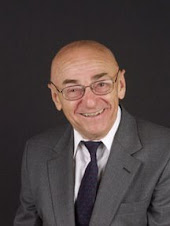...we are all part of one family. That's not just a nice, naive image; either we are all losers or all winners in terms of survival. Now we can't say it makes sense for just one nation to be powerful, rich, and so forth. If the whole world is starving, we'll create immense wars and difficulty. And the environment can only be a chance national solution. So hopefully, evolution wouldn't take hold quickly enough so that altruistic behavior become — not just seemingly altruistic behavior, which is selfishness in disguise...True altruism is a genuine consideration for all sentient beings, whether they are your tribe, your relatives, your own gene lines — forget about that, it has now to be concern for all that lives. (Full transcript)
Monday, October 31, 2011
"Happiest Man in the World"
No, not me on Friday night after the last out of the 2011 World Series, but Matthieu Ricard (despite his "1,000 disclaimers"). He was just featured on "On Being" (the radio show formerly known as "Speaking of Faith") with Krista Tippett. We read him in SOL last month. A wise man, combining the best of science and humane spirit.
Friday, October 28, 2011
Wednesday, October 26, 2011
Dumbledore as philosopher
We had excellent midterm report presentations in Co-Phi yesterday. Asiyah, Hannah, Allie, and Katie collaborated on Harry Potter & Philosophy, and Amanda did Sex in the City. Only one of us had issues with Harry, whose creator-- herself the creator of Albus Dumbledore-- is certainly a philosopher. I'm glad he (not Aristotle) ran Hogwarts. The quote my daughter the Slytherin gave me hangs above my desk:
Here was my brief and bleary post after returning from the midnight screening of the last film.
But, Amanda: Carrie Bradshaw as philosopher? I'll have to think some more about that. Liked your report, though.
Happiness can be found, even in the darkest of times, if one remembers to turn on the light.Not sure my mind is organized or Socratic enough to share the wise old wizard's view of death as just an adventure waiting to happen, but I'm trying.
Here was my brief and bleary post after returning from the midnight screening of the last film.
But, Amanda: Carrie Bradshaw as philosopher? I'll have to think some more about that. Liked your report, though.
Tuesday, October 25, 2011
Thursday, October 20, 2011
Do humanists need a chaplain?
Or a church? Or even a community center?
P."Zed" Myers thinks not, emphatically, but at Harvard they've got one, namely Greg Epstein. [HarvardHumanist's YouTube Channel] They've been debating the whole concept of humanist communitarianism on Twitter (#humanistcommunity).
Myers notwithstanding, I've often heard humanists, atheists, and secularists of various other stripes express regret at not enjoying the conviviality and "fellowship" available to church-based religionists. Some of us have the Church of Baseball, of course; but for others Epstein is pushing to create something more like a community of non-believers. He's been hosting talks, not quite sermons, in service of that goal. Jennifer Hecht gave one recently:
P."Zed" Myers thinks not, emphatically, but at Harvard they've got one, namely Greg Epstein. [HarvardHumanist's YouTube Channel] They've been debating the whole concept of humanist communitarianism on Twitter (#humanistcommunity).
Myers notwithstanding, I've often heard humanists, atheists, and secularists of various other stripes express regret at not enjoying the conviviality and "fellowship" available to church-based religionists. Some of us have the Church of Baseball, of course; but for others Epstein is pushing to create something more like a community of non-believers. He's been hosting talks, not quite sermons, in service of that goal. Jennifer Hecht gave one recently:
Monday, October 17, 2011
Thursday, October 13, 2011
The meaning of life
(Also known as the "secret of happiness")...
A student in CoPhi yesterday posted the lyrics of a vulgar song by the old punk band The Dictators, purporting to express the meaning of life. I found it a bit reductive. Here's a more expansive view, from the conclusion of Bertrand Russell's 1930 Conquest of Happiness:
A student in CoPhi yesterday posted the lyrics of a vulgar song by the old punk band The Dictators, purporting to express the meaning of life. I found it a bit reductive. Here's a more expansive view, from the conclusion of Bertrand Russell's 1930 Conquest of Happiness:
The happy man or woman is
a citizen of the universe, enjoying freely the spectacle that it offers and the joys that it affords, untroubled by the thought of death because he feels himself not really separate from those who will come after him. It is in such profound instinctive union with the stream of life that the greatest joy is to be found.
The "secret" is this:
Let your interests be as wide as possible , and let your reactions to the things and persons that interest you be as far as possible friendly rather than hostile.
Maybe. But maybe those other Brits were onto something too:
Well, it’s nothing special. Try and be nice to people, avoid eating fat, read a good book every now and then, get some walking in and try and live together in peace and harmony with people of all creeds and nations.
Fundamentally that's all the same advice, isn’t it? Someone should put it in a song.
Wednesday, October 12, 2011
"Global Perspectives on the Holocaust"
The annual Holocaust Studies Symposium is back on our campus next week, Oct. 19-22. Here's this year's program... and here was my notice of the excellent conference two years ago.
Organized in 1988, the Middle Tennessee State University Holocaust Studies Committee's original mission was to encourage the study of the Holocaust at Middle Tennessee State University and in the mid-South. Since that time the committee's mission evolved to:
- disseminate greater understanding of and knowledge about the Holocaust from an inter-disciplinary and bi-gender perspective;
- serve as a bulwark against the spread of Holocaust denial and antisemitism, as well against racial, religious and ethnic hatred;
- memorialize the lives and suffering of all people persecuted during the Holocaust. These include but are not limited to Jews, Sinti and Roma, homosexuals, Hitler’s political opponents, people of African descent, Slavs, Jehovah's Witnesses and other religious groups, and persons with physical or mental disabilities
- raise awareness in both the academic community and the general public that genocidal hate did not end in 1945 by disseminating information about other genocides, past and present.
Tuesday, October 11, 2011
Santayana on the meaning of life
In SOL today we're reading Bertrtand Russell on the "causes of happiness." Foremost among them, for him, was the constant courting of "zest" in life. This led me to consider William James on "what makes a life significant" and "the solid meaning of life"... and that, to their contemporary George Santayana. There is no cure for birth and death, Santayana said, save to enjoy the interval.
As Older Daughter would say: "True dat."
Thursday, October 6, 2011
Steve Jobs, 1955-2011
Every day is doomsday. Steve Jobs at Stanford, 2005:
When I was 17, I read a quote that went something like: "If you live each day as if it was your last, someday you'll most certainly be right." It made an impression on me, and since then, for the past 33 years, I have looked in the mirror every morning and asked myself: "If today were the last day of my life, would I want to do what I am about to do today?" And whenever the answer has been "No" for too many days in a row, I know I need to change something. commencement address
Reasons for Reason - NYTimes.com
Finding common currency is not so easy these days, but as David Hume said: there, not in a narrow and sterile concept of "reason," is ultimately where our values abide. So we'd best keep looking, and had best not constrict our "reason" either.
Hume’s point, in alluding to what he also sometimes called “the principle of humanity” was that the ideal of civility requires us to find common currency with those with whom we must discuss practical matters...
'via Blog this'
Tuesday, October 4, 2011
How Yoga Won the West - NYTimes.com
More philosophy in the Sunday paper:
When the Hindu sage Vivekananda made his way to America over a century ago,
The Harvard philosopher and psychologist William James was fascinated by the 31-year-old Indian and quoted at length from Vivekananda’s writings in his seminal work, “The Varieties of Religious Experience.”“A very nice man! A very nice man!” Vivekananda reported after his first meeting with James, who called his new friend “an honor to humanity.”The novelist Gertrude Stein, then a student of James’s at Radcliffe, reportedly attended Vivekananda’s 1896 talk at Harvard — which so wowed the college’s graybeards that they offered him the chairmanship of Eastern philosophy. He declined, noting his vows as a monk.
'via Blog this'
Monday, October 3, 2011
The Swerve
Excellent review in yesterday's Times by Montaigne biographer Sarah Bakewell, on a new account of ancient atomism in Lucretius (and before him Democritus and Epicurus)...
“What human beings can and should do is to conquer their fears, accept the fact that they themselves and all the things they encounter are transitory, and embrace the beauty and the pleasure of the world.”Montaigne, too, was a fan of ancient atomism. He scooped Nietzsche on eternal recurrence:
“Since the movements of the atoms are so varied, it is not unbelievable that the atoms once came together in this way, or that in the future they will come together like this again, giving birth to another Montaigne.”
In a separate review, Dwight Garner finds a Woody Allen angle and adds that for Lucretius
“there is no master plan, no divine architect, no intelligent design.” Religious fear, Lucretius thought, long before there was a Christopher Hitchens, warps human life... living a full life include[s] friendship and philanthropy and fundamental happiness.
As for the atomism itself,
the philosopher George Santayana would call this “the greatest thought that mankind has ever hit upon.”Well, maybe... 'til Darwin had the best idea ever.
'via Blog this'
Sunday, October 2, 2011
I wonder why
Found it!
We just had a bunch of old family VHS tapes converted to DVD, and the other night watched Older Daughter's first four birthdays. The highlight, for me, was her singing a clever song called "I Wonder Why." I couldn't remember where she'd gotten that song, and it's been bugging me since. I just found it:
Subscribe to:
Posts (Atom)






 Charles Darwin (
Charles Darwin (










